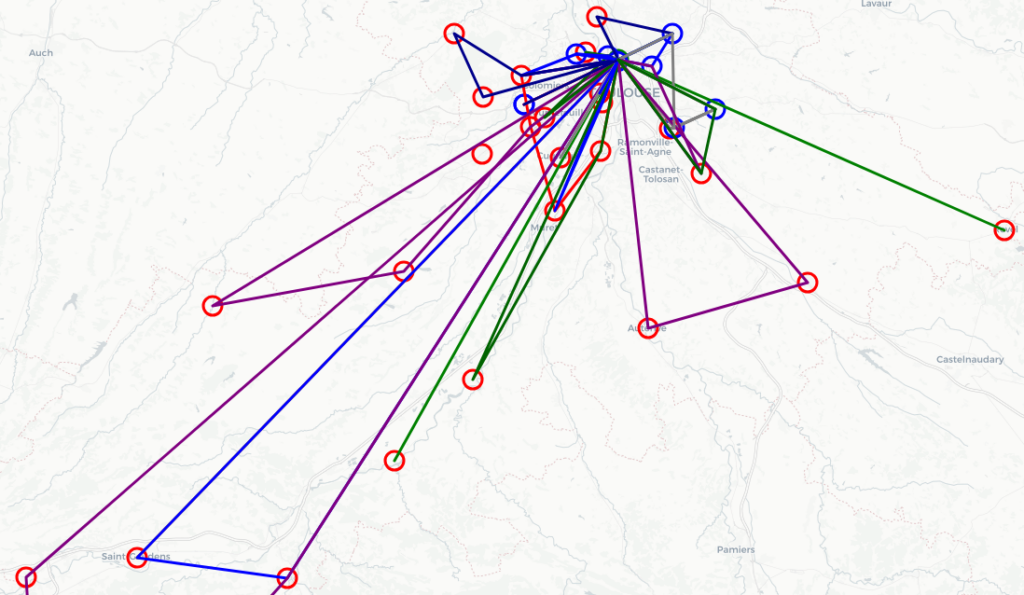How Les Restos du Cœur solve food distribution problems with Hexaly

Les Restaurants du Cœur, or Les Restos du Cœur for short (literally Restaurants of the Heart but meaning Restaurants of Love), counting around 75,000 volunteers, is one of the biggest charities in France. The organization targets both homeless and low-income people (single families, elderly people with low pensions, young adults, etc.), helps people find housing, and supports other projects. However, its main activity consists of distributing food packages and hot meals to those in need. Here, we focus on Les Restos du Cœur’s food distribution problem in the Haute-Garonne region in France. For a charity as large as Les Restos du Cœur, gathering and redistributing donated food to distribution centers constitutes a complex routing problem with many difficult business constraints. Convinced by the solver’s compelling benchmarks on routing problems, they chose to entrust its resolution to Hexaly.
Les Restos du Cœur’s food distribution problem
The donated food pallets must be collected from supermarkets and temporarily stored in the Restos du Cœur warehouse. Nine supermarkets are involved in the operation, each donating food several times a week. The pallets are then picked up again and delivered to 29 distribution centers around Toulouse. All deliveries are performed in the mornings between Monday and Friday, with specific time windows for each location, using a fleet of 12 heterogeneous trucks. There are also strong compatibility constraints between the trucks and the pallets. Indeed, fresh and frozen foods require specific kinds of refrigerated trucks to be safely transported.
Heterogeneous fleet
- Classic and refrigerated trucks
- Different capacities, both in weight and number of pallets
- Different fixed and variable costs
Time windows
- Maximum time to pick up donated food from supermarkets
- Maximum time to deliver food to distribution centers
- Road traffic to take into account
Many business constraints
- Accessibility constraints: bigger trucks cannot access certain locations
- Specific centers must be delivered first
- Different opening days for the supermarkets and distribution centers
Objectives
- Minimize fixed and variable costs
- The schedule must be flexible, as delivered quantities tend to vary from one week to the next
Resolution using Hexaly Optimizer
Les Restos du Cœur’s food distribution problem also has a stochastic aspect. Indeed, the quantities of food donated by the supermarkets are not known in advance, making the problem even more challenging. Thanks to Hexaly Optimizer’s fast computation times, the volunteers were able to run the model multiple times to test different configurations. Their methodology consisted of generating instances of the problem with pessimistic quantities, running the optimization to find a reference solution, and evaluating its flexibility by:
- Generating around 30 to 50 scenarios with different quantities to be delivered
- Adding constraints to the model to allow only minor changes from the reference solution (e.g., assigning deliveries to a previously unused truck, including an additional delivery to an existing route)
- Computing the number of feasible scenarios and the average cost of the feasible solutions on the generated scenarios
Finally, after running this procedure with several reference solutions, the one that maximizes the number of feasible scenarios and minimizes the average cost is selected.

Why Hexaly?
The optimization engineers at Les Restos du Cœur were delighted with Hexaly Optimizer’s performance and ease of use. Thanks to Hexaly’s innovative set-based modeling formalism, prototyping took very little time. They could thus test new long-term ideas, such as using fewer trucks, changing the delivery days, or investing in a new type of truck capable of simultaneously transporting different kinds of food. They were also very happy to benefit from the reactivity of Hexaly’s support team, who helped them write the best possible models very quickly.
That, combined with Hexaly Optimizer’s fast solving times, enabled them to efficiently evaluate the flexibility of the solutions. Indeed, with less than a minute of running time, they could test multiple scenarios with randomly delivered quantities and find more robust solutions.
Solving our complex routing problem became a breeze with Hexaly. Its high-level declarative language made tackling multiple constraints intuitive and straightforward. The lightning-fast performance of Hexaly Optimizer didn’t just speed up solving times—it unlocked the ability to run powerful what-if analyses, giving us deeper insights for fleet management decisions. Even the unpredictable, stochastic nature of the problem was no match, as we could simulate hundreds of scenarios in just minutes. Hexaly turned a challenging task into an opportunity for smarter, faster, and more confident decision-making.
Please look at our customers’ webpage to discover more industry case studies.
Ready to start?
Discover the ease of use and performance of Hexaly through a free 1-month trial.

